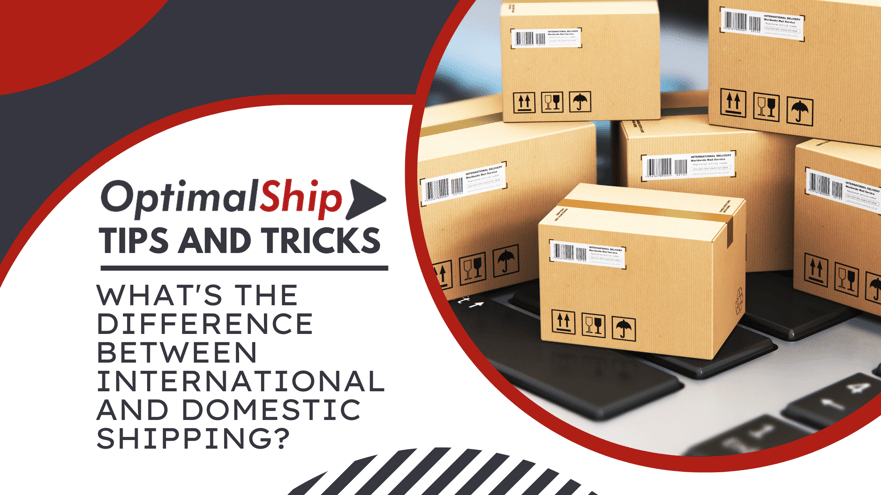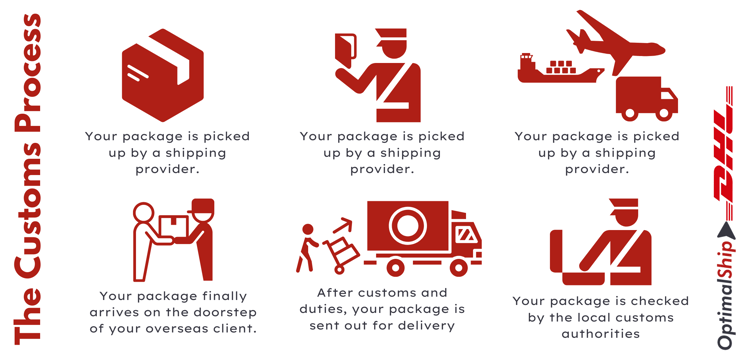
If your company is thinking about shipping internationally, you’re probably already shipping domestically. That makes sense; it’s much easier, in almost every country, to start shipping to places within your borders. The rules are consistent within a country and packages get to where they need to go without the hassle of customs and other delays.
As you consider whether you want to expand internationally – even if it’s just to Canada and Mexico – as a U.S. seller, you need to begin by knowing the major differences between international shipments and domestic shipments. The differences are monumental.
What is Domestic Shipping?
Domestic shipping is when goods or documents are shipped from A to B within a country's borders. Often, these services can be extremely fast, and sometimes same-day delivery is available from certain carriers. Two-day and three-day delivery options are common.
Compare this to international shipping, where two-day and three-day delivery times are exceptional and often more costly. In addition, while delays in domestic shipping are uncommon, international shipments can be held up at borders of either the exporting or importing country for customs inspection.
Document Requirements
When you ship domestically within the US, you don’t usually need to include any documents beyond a shipping label. Occasionally you may pay for things to be certified, tracked, or handled carefully, but those services are optional. Export documents, in most cases, are absolutely required.
Except in the case of shipping a lone document, most international shipments require documents like:
- Commercial invoice that includes the value and harmonized code of each item in the shipment
- Packing list for shipment
- EEI (electronic export information) for shipments valued over $2,500
A certificate of origin is required in some cases as well. Usually, this is when the U.S. has an FTA (or free-trade agreement) with a country, or when a country simply requires one to prove the origin of the product being shipped. Israel, for example, has very specific certificate of origin requirements for all incoming imports.
Customs Authorities
Every country has a place where packages and mail from other countries land, and each country has a customs department there. When you’re shipping domestically, most packages simply travel to their destination, get delivered, and everything continues as normal. Customs departments only come into play when something is shipped internationally. Customs departments are responsible for collecting taxes on imports and exports (you’ll also see these taxes called “duties”, or even “taxes and duties”).
Each item that is exported must go through TWO customs departments – one for the exporting country and one for the importing country. This means you’ll need to comply with both your own country’s export rules and the receiving country’s import regulations.

This can be ruthlessly confusing, especially since every country is different. They have different taxes, rules on when things get taxed, and how long things can be held in customs. Many customs departments can open boxes to examine goods and hold packages until duties are paid.
Customs can be difficult to navigate, so make sure you have a good shipping company, 3PL, or freight forwarder on your side for when your package is stuck for 15 days and no one is answering the phone. Unfortunately, this does happen.
Restricted and Limited Goods
If you ship a computer to your sister in Utah and you’re in Florida, it’s likely that no one will bat an eye. However, if you ship the same computer to India, not only will you need to fill out documents explaining the export, you'll need to declare a value, define the product, ensure the battery is inside of the computer, and let your sister know she will likely need to pay taxes and duties to retrieve her electronic.
This is because there are restricted – banned – and limited goods for each country. In the case of a computer, lithium-ion batteries are flammable and have strict rules in place to ensure the safety of the shipment and people involved in transporting. In addition, pilots can refuse items if they feel unsafe flying them across the ocean. Lithium, alcohol (even if it's in hand sanitizer or lotion) and other flammable items will be refused before they’re even set on the plane in many cases. Goods can even be taken off a plane after they’ve been loaded if there’s an issue noticed. In most cases, you are still liable for the shipping costs if this happens, so ensuring your shipment is compliant is essential.
To help with understanding and knowing these limitations, you can visit the Commerce Department’s Country Commercial Guides. This information is excellent, and it applies not only to restricted goods, but to duties and taxes – including rates –as well.
What do you ship internationally? How did it go for you?
If you're concerned about being able to clear customs, we've got a handy checklist to help you out!
